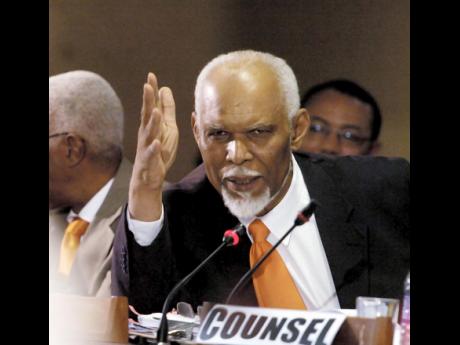Senate dumps faulty clause from Evidence Bill
The presumption that was built into the Evidence (Amendment) Act that a computer from which evidentiary material has been recovered was working at the material time was yesterday dumped by senators who gave their nod to the bill that has been languishing for approximately five months.
Section 31(G) of the existing legislation that deals with computer-generated evidence is to be repealed with a new position, which is to make it easier to introduce such evidence in a trial. The initial bill, tabled last year, had proposed that where a document tendered into evidence is produced by a computer, it shall be presumed, in the absence of evidence to the contrary, that the
computer was, at all material times, working properly.
Government Senator K.D. Knight was among those who objected to the provision when the bill was last before the Senate, saying it would remove a burden now placed on prosecutors and shift that evidentiary burden to a defendant.
"It would be a blow to justice. Some accused persons, especially from certain strata [of society], are going to go to court, hear the word 'guilty' pronounced, and that word is [going to be] pronounced merely because the accused person had not the wherewithal to challenge the computer evidence produced, and an innocent person goes to prison," Knight said in January.
Difficulty in court
Yesterday, Tom Tavares Finson, the leader of opposition business, followed in like manner. He noted that the prosecution and defence attorneys have been having difficulty getting computer-generated evidence in the court.
"The situation which existed in the 1995 piece of legislation essentially placed an onus on the party, be it prosecution or defence seeking to use the computer-generated evidence, seeking to use it to establish a number of things, including that the computer was operating properly and was not subject to malfunction of any sort," Tavares Finson said.
"A number of prosecutions had faltered because of difficulty in crossing what was considered to be a difficult hurdle in relation to the admission of computer evidence, and we have lagged behind other Commonwealth jurisdiction in upgrading our legislation," he added.
Tavares Finson, however, argued the clause in the proposed bill that assumed the computer was in working condition was an unfair shift in the burden of proof, which would prejudice the accused.
He welcomed the amended provision which states that the party that intends to use the computer-generated evidence in a trial would present the certificate from an expert indicating that the computer was in proper working condition.
Justice Minister Mark Golding admitted that the revised framework is a model that has been adopted, with modifications, from the United Kingdom, a jurisdiction that moved away from it.
"It allows a party seeking to rely on computer-generated evidence (to) produce a certificate, issued by a person responsible for the operation of the machine, give notice to the other side of that certificate, and that certificate, if admitted will be deemed to be evidence to the fact stated therein that the machine had been working at the relevant time," Golding said.
"We have put in there a savings provisions that will allow the court, on the application of a party, to require the actual persons who are in a position to speak to the working of the machine to attend court if they believe that the probative value of the certificate will be outweighed by the prejudicial effect that it would have," he added.
The minister has committed to keeping the legislation under review.

